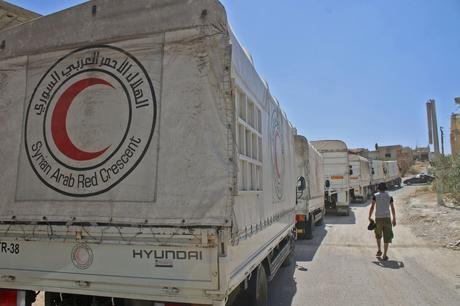
(United Nations) The authorization of the UN allowing since 2014 cross-border aid in Syria expired Friday without the Council of security, deeply divided, able to extend this vital humanitarian assistance for millions of people.
Published on 10 July 2020 at 19 h 03 Updated at 21 h 43
Philippe RATER
France Media Agency
After five ballots since Tuesday, all in vain with twice a double veto of Russia and China on their proposals, Germany and Belgium have taken a final initiative to save this device with a new hoped vote this week-end.
But presumably, diplomats told the AFP, on the conditions of Russia which had already imposed a sharp reduction in this mechanism in January at the UN and which wants to further reduce it.
The UN cross-border authorization allows aid to be delivered to the Syrian population without the approval of Damascus.
The system relied until Friday on two entry points in north-western Syria, on the Turkish border: at Bab al-Salam, leading to the Aleppo region, and at Bab al-Hawa, serving the insurgent region of Idlib where almost four million Syrians live.
Russia judges that the UN cross-border authorization violates the sovereignty of its Syrian ally. She wants the Bab al-Salam entry point removed, arguing that it is much less used than Bab al-Hawa and that aid under Damascus control can be increased for the Aleppo region.
Westerners reject these arguments. They argue that there is no credible alternative and argue that the Syrian bureaucracy and politics are preventing an efficient flow of aid to areas that remain out of the Syrian regime’s control.
On Wednesday, the United States declared that the maintenance of two access points in Syria represented a “red line”. But several diplomats told AFP on Friday that the solution now sought by Germany and Belgium rests on maintaining access to Bab al-Hawa with the abandonment of that of Bab al-Salam.
In January, Moscow, after a veto at the end of December, had the system reduced from four to two border crossing points and for six months, while the authorization was renewed annually since its creation.
“Black day”
This week, Russia and China have once again used their veto power as permanent members, Tuesday and Friday, accused by NGOs and Western countries, of abusing and politicizing a humanitarian subject.
All Russian counter-projects, during the votes, did not exceed four votes in their favor. To be adopted, a resolution must win a minimum of 9 votes in favor 15, without voting against one permanent member of the Security Council.
“We are ready to work 24 hours on 24 and call on others to think of the millions of people in Syria who are waiting for the Security Council to decide their fate, “the German ambassador to France said in a statement on Friday evening. 'UN, Christoph Heusgen, president in July of the highest UN body.
With Belgium, another non-permanent member of the Council, Germany is in charge of the humanitarian aspect of the Syrian dossier at the UN.
The double veto on Friday of Moscow and Beijing inflicted on Berlin and Brussels was 16 e for Russia and 10 e for China on a text linked to Syria since the outbreak of the war in 2011.
For the UN, maintaining as many crossing points as possible was crucial, especially given the risk of the COVID pandemic – 19 who wins the region.
In June, the UN secretary general, Antonio Guterres, had asked in a report for the extension of the cross-border device for one year by including at least the two access points which were used until Friday.
After the new Russian-Chinese double veto, the NGOs strongly criticized in unison the inability of the Security Council to reach agreement.
David Miliband, president of the NGO International Rescue Committee, denounced “a dark day” for the Syrians and a “shame”. “Russia and its opponents to the Council see these exchanges as a way to gain political points against each other, but it is not a game,” said Richard Gowan of the International Crisis Group.

